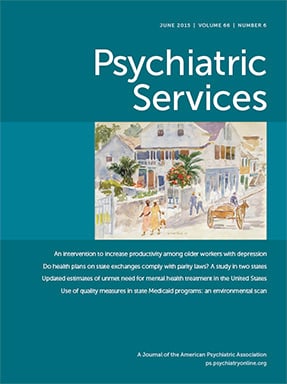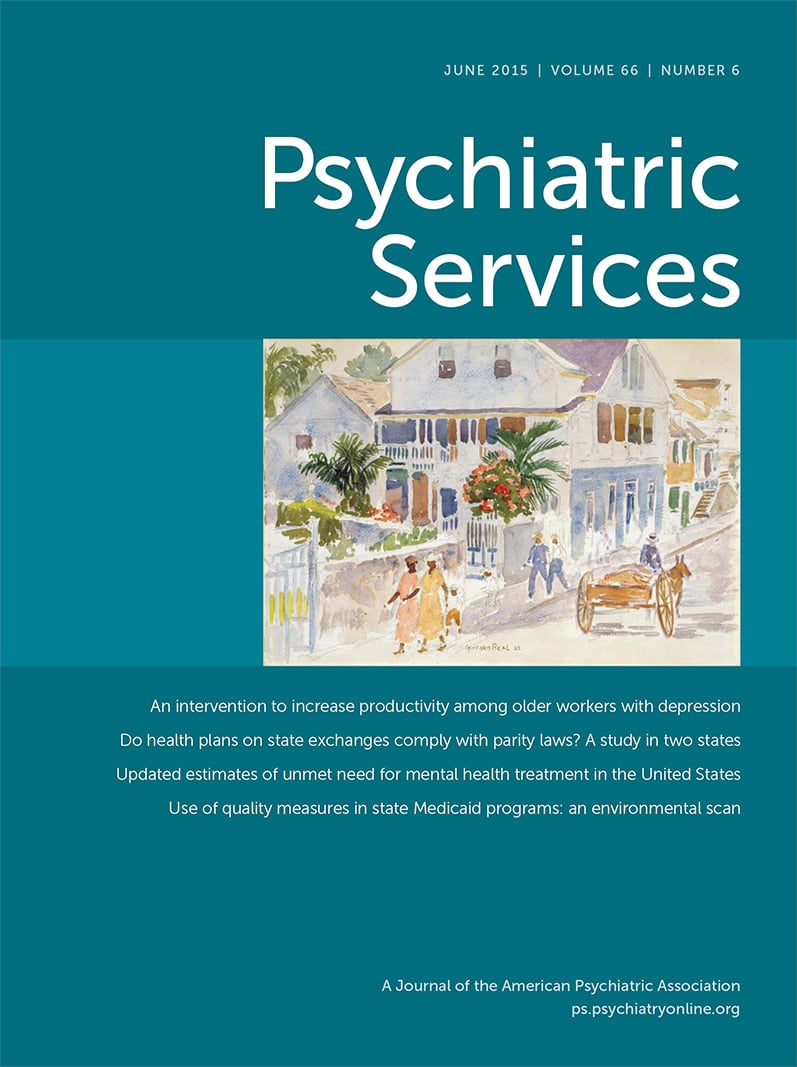Opening Doors to Recovery (ODR) is a recently piloted, community-based, recovery-oriented service model for persons with serious mental illnesses. ODR was designed by the Georgia affiliate of the National Alliance on Mental Illness (NAMI-Georgia) in conjunction with public and private not-for-profit partners (
1). A key aspect of ODR was service delivery by three community navigation specialists (CNSs)—a peer specialist, a mental health professional, and a new kind of care provider called a family CNS (F-CNS). This qualitative study focused on the F-CNS role and its potential for enhancing service delivery.
Each F-CNS had at minimum a bachelor’s degree and was a parent, sibling, child, or spouse of a person who has used public mental health services. Creation of the position was inspired by the successes of peer care providers—who, as people living in recovery, offer services to others pursuing recovery (
2–
5)—as well as the evidence for family-based interventions. Peer care providers offer a range of services, including promoting self-determination, personal responsibility, and health and wellness; combating stigma and hopelessness; and facilitating communication with care providers (
6). Peer providers are role models (
7) and in some care situations are at least as effective as professional providers (
8). Individuals who use peer support services report feeling a renewed sense of hope and purpose (
9,
10), and they appreciate having a person-centered, empathic, “expertise by experience” person on the treatment team (
7,
9,
11).
F-CNSs, as conceptualized by ODR, are also experts by experience and may help the team with educating, supporting, and empowering families. There is some evidence that family-based interventions are important to recovery (
12) and can be successfully delivered by family members themselves (
13). Even so, remarkably few programs have used a family member for outreach and as a paid care provider (
14).
During ODR’s initial demonstration from 2011 to 2013, the F-CNSs supported the families of participants. They helped connect families to family-focused interventions (for example, family psychoeducation) and answered questions about service referrals. They bridged relationships between the ODR participant, family members, the community, and the treatment team. The F-CNSs also engaged in “resource mapping” of community resources for participants and their families.
Because the original ODR research study examined the overall model rather than its specific components, we conducted a preliminary, qualitative study to elicit perspectives on what was novel, useful, and not useful about the F-CNS role.
Methods
We used a qualitative approach (
15) that was based on semistructured interviews to explore what people perceived to be useful or not useful about having an F-CNS on the service team. A total of 30 individuals were interviewed between November 2011 and December 2012: ten individuals with serious mental illnesses (ODR participants), ten family members of ODR participants, and ten leaders and service providers involved in ODR, two of whom were F-CNSs. Two research assistants familiar with study participants (from an overarching quantitative study) conducted the interviews. Recruitment occurred via telephone or e-mail or in person. Informed consent was obtained under the oversight of the George Washington University Institutional Review Board.
Interviews lasted approximately 30 minutes. Topics included how the F-CNSs were useful or not useful, how they compared with other team members, and what might improve their role. All interviews were audio-recorded and transcribed and then uploaded to Saturate, version 1, for coding, sorting, and organization. Coders compared every third transcript to narrow, expand, or delete codes in cases of disagreement and to establish interrater reliability (
15). Codes were then condensed to identify key findings in the data by grouping codes with common themes into larger themes. The themes relevant to our initial query are reported here.
Results
Eight of the ten participating family members felt that the F-CNS helped represent the family’s perspective during treatment planning. Twenty-five of the 30 participants found the F-CNSs to be a positive addition to the teams because they were very supportive. For example, one ODR participant claimed that the F-CNS “would make time for me and do anything to help me, talk to me.” Another ODR participant noted that the F-CNS “would go beyond the limit” to help. One family member explained, “[the F-CNS] knows how to relate to us . . . to help us get understanding of mental illness and how to better help.”
Eight study participants thought that the F-CNSs’ lived experiences helped them provide better care and support. The F-CNSs “have that unique perspective of having been in the shoes of someone trying to support their loved one and they know about the stress and strain that comes with that,” a professional CNS stated. “There’s a very large perspective that’s usually missed,” one F-CNS explained. “Family members usually aren’t exactly included in a lot of what goes on. A lot of bridges have often been burned, so you can help them rebuild them.”
Twenty-one study participants indicated that the F-CNS is a strong communication liaison. As one ODR participant explained, “[the F-CNS] would try to get stuff done quicker if I needed a different med change, if I needed counseling meetings set up, transportation—[the F-CNS] was there for all of that.” Most viewed the F-CNS as an advocate who had intervened with good communication. One family member noted, “[The F-CNS] really reached out to the officers [during an arrest for disorderly conduct] and prevented [the ODR participant] from going to jail that time.”
The F-CNS also seemed to make positive contributions to family interactions. One F-CNS explained, “[The F-CNS] can be that voice of the family when that person may not really want to listen to family. . . . Maybe to put things in a different way, and be a little less angry.” A family member similarly described the F-CNS as “an advocate, for [the ODR participant],” who “works between the patient and the caregiver or the family member who was trying to help . . . to be that middleman, to help them both understand and meet in the middle.”
Some concerns were raised with the F-CNS role. Fifteen study participants felt that the F-CNSs’ responsibilities and duties had been insufficiently described. One ODR participant said, “I still don’t understand. . . . I thought [the F-CNS] was a counselor like [a professional CNS].” An administrator added, “I think it got lost somewhere along the way, and it never got fine-tuned enough that it was clear up and down the chain. . . . We all knew what a licensed social worker was, and we all knew what a peer specialist was, but we kind of didn’t know what a family CNS was.” In another example, a family member did not feel that the F-CNS explicitly mentioned personal family experience: “She never introduced herself as having taken care of family members.”
Six interviewees claimed that the F-CNS role was limited. One ODR participant explained, “You can learn a lot more from [a peer CNS] because . . . it’s something he went through. It helps us to know that we can recover, and we can also be peers if we recover and get ourselves on the right track.” Similarly, one professional CNS explained, “Depending on their background, they lack clinical judgment that maybe the professional CNS has. And then, obviously, the street knowledge that the peer CNS has. Without having that experience, they might be thrown into situations . . . not really knowing what to do, where the other CNSs have been exposed.”
Discussion
Our findings indicate that having a family-focused member on the treatment team may add value. F-CNSs shared lived experiences with family members (much as peer care providers share lived experiences with peers). They also represented the family perspective in treatment planning; served as a communication liaison; and educated, advocated, and intervened during crises by forming community circles of support for the participant. “Circles of support” refers to a group of people willing to encourage and support clients’ recovery consistently and as needed. In the ODR project, the F-CNS was envisioned as an advocate for ODR participants, their families, and participants’ broader circles of support. In most cases, our initial findings suggest that respondents viewed the F-CNS as a positive addition. F-CNSs were regarded as supportive and empathic to ODR participants and family members. Although the F-CNS role was designed partly in response to the known effectiveness of family interventions, future implementations of the F-CNS position could more formally engage in family-based services (for example, more formal referral to NAMI’s Family-to-Family program).
An important finding of this study is that a minority of study participants were unclear about the role differences between the professional, peer, and family CNSs. These respondents suggested that the F-CNS role was not explained well or that it overlapped with the roles of other team members and was thus insufficiently differentiated. In addition, because this small study evaluated the F-CNS position in general, variation across the F-CNSs in the four ODR CNS teams implemented during the demonstration project could not be assessed. Future research can more clearly demarcate the role of the F-CNS and investigate variations between F-CNSs.
Conclusions
The novel F-CNS role has potential for enhancing services for persons with serious mental illnesses, their family members, and other mental health providers (for example, peer specialists and licensed clinicians). The F-CNS may provide much-needed support and advocacy and serve as a dedicated resource for the family. Overall, the F-CNSs were helpful and their contributions were constructive, but their effectiveness seemed to be perceived more ambivalently the farther they got from the “family-centric” role. Going forward, this role warrants more rigorous investigation with regard to effectiveness, cost-effectiveness, and acceptability across diverse stakeholders.

